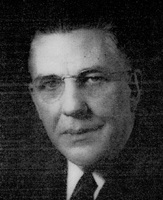 | Back to e-WV
| Back to e-WV
 The West Virginia Encyclopedia
The West Virginia Encyclopedia
 | Back to e-WV
| Back to e-WV
 The West Virginia Encyclopedia
The West Virginia Encyclopedia

Judge Frank Cruise Haymond (April 13, 1870-June 10, 1972) was born in Marion County. He received his LL.B. degree from Harvard Law School. He practiced law in Fairmont and served for six years as judge of the Circuit Court of Marion County.
In July 1945, Haymond was appointed to fill a vacancy on the West Virginia Supreme Court of Appeals by Governor Clarence Watson Meadows. Haymond was elected to the court in 1946 and was reelected to two more 12-year terms. At the time of his death at age 102, Haymond had served longer on the high court than any past jurist.
Judge Haymond brought from Harvard a rigorous judicial philosophy that held that all related cases were to be systematically referenced and that the court must assiduously build on past decisions. There was to be no ‘‘legislating’’ from the bench. One hallmark of Haymond’s opinions was the habitual citation of long lists of cases (from both state and federal courts) in support of his argument. Haymond was no legal innovator, and not one to impose his judgment on the situation. He believed that the courts should not go beyond what he called the plain meaning of a statute or decided case.
One of Haymond’s last opinions reversed Judge George Triplett of Randolph County, who had declared incarceration at the aging Moundsville state penitentiary unconstitutional on the grounds that it violated the prohibition against cruel and unusual punishment. At the time, according to the New York Times, this prison had the highest per capita murder rate in the nation. Haymond’s opinion excoriated Triplett at length for going beyond precedent and intruding upon the executive and legislative prerogatives. Ironically, less than a decade after Haymond’s death the state Supreme Court unanimously declared imprisonment at the state prison unconstitutional on the grounds that the Haymond court had rejected, and mandated the building of a new penitentiary.
In 1970, Judge Haymond received the American Bar Association’s prestigious ABA Medal, which is awarded to a lawyer or judge who has ‘‘greatly advanced the cause of jurisprudence.’’ No other West Virginian has ever been considered for this honor.
Written by H. John Rogers